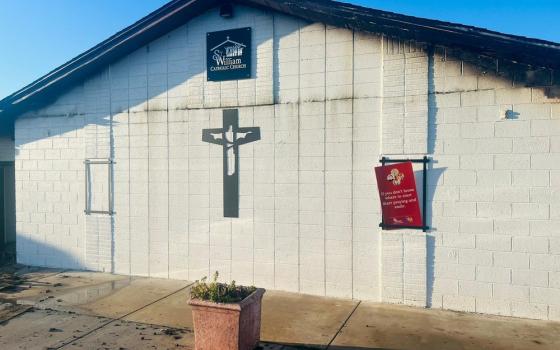
The interior of Sacred Heart Cathedral in Davenport, Iowa (Wikimedia Commons/Farragutful)
The new guidelines for LGBTQ+ pastoral care that the Diocese of Davenport, Iowa, released Oct. 4 are a strikingly positive approach that has the possibility to shift the trend of transgender-negative diocesan policies in the U.S.
Three of the guidelines' most notable aspects are their primary purpose of acceptance and welcome, their primary lens of social justice, and their primary method of consultation and collaboration. All three of these aspects set the document apart from the dozens of other diocesan gender policies that have been released previously.
First, the primary purpose of the Davenport guidelines is the well-being of LGBTQ+ people and their families.
Most often, diocesan gender policies have been framed as a necessary defense of Catholic teaching and identity, set against society's evolving understandings of gender and widening acceptance of transgender and nonbinary people. The Davenport guidelines, however, explicitly name a "pastorally sensitive, practical, and faithful" response to LGBTQ+ people as their purpose.
These guidelines rightly name that loving a person is far more important than defending church teaching. The document states, "We are not dealing simply with ideologies or issues but with people who are created in the image and likeness of the Creator."
This sentiment is very similar to Pope Francis' repeated exhortation that reality is more important than ideas.
Second, the primary lens of the Davenport guidelines is the church's social justice tradition.
Promoting human dignity is strongly emphasized as the first principle and starting point for all other considerations. Again, this perspective contrasts with other diocesan policies that focused on sexual and gender ethics, such as the morality of gender-affirming health care or which restroom a person can use.
The Davenport guidelines are honest that failing to put social justice principles, like human dignity, first, the Christian mandate to love is lost. The guidelines' own call to love "may seem overly simple,'' yet "in practice this is often neglected."
Leading with social justice values allows the church to love LGBTQ+ people in meaningful ways, like protecting them from discrimination and ensuring good pastoral care is provided. And this must happen even when "we may not always perfectly understand the people to whom we minister, or even agree with all of their viewpoints."
Advertisement
Third, and most significant, is the process underlying how the guidelines were created and how they understand LGBTQ+ pastoral care going forward.
The Davenport guidelines were developed by a committee that listened to transgender people, their families, pastoral ministers, medical experts, theologians and others with the right expertise. At the core of this work, however, was listening to the people most impacted: LGBTQ+ people.
The guidelines emphasize that LGBTQ+ people should be given "the benefit of the doubt in regard to their experiences and motivations," not treated as threats as so many other diocesan policies have. Indeed, the document explains:
The most basic and first expression of our love should be to listen. This is not a listening to refute or with an agenda, but to truly understand people — their experiences, needs, and concerns. This requires humility, patience, and self-control. The more we understand someone, the better we can accompany them.
This insistence on consultation also challenges church leaders and pastoral ministers to examine their biases, which might "put conditions on our love." Two of the document's concluding questions are: "What are your biases or blind spots?" and "Who else should be consulted to help build understanding?" Wide consultation and collaboration are fundamental.
Such a process led the Davenport committee to release guidelines, not answers. They outline principles, not policies, repeatedly emphasizing that LGBTQ+ pastoral care, particularly around gender identity, must be focused on individuals with a case-by-case approach. It is that point that gives me hope for a broader impact.
In New Ways Ministry's workshops and trainings, we always begin by telling participants that we cannot provide ready-made answers because those on the ground know their school or parish best. Only they know what is needed most, what is possible given their circumstances, and what a next step or two should be. The Davenport guidelines do likewise by offering principles upon which to discern pastoral responses.
What would it mean for more U.S. dioceses to respond similarly? Rather than imposing policies generated by church officials distanced from LGBTQ+ people and their families, what if dioceses began with the understanding that "each person, family, and set of circumstances is unique and personal" and that "something that is appropriate in one place or situation may not be appropriate in another"?
What if dioceses trusted pastoral ministers, educators, and parents and allowed them latitude to figure out what is best in and possible for a transgender child or lesbian parishioner?
Almost all of the four dozen diocesan policies on gender and sexuality have failed to follow such a path, leading to untold amounts of frustration, suffering and harm. The Davenport Diocese now provides another path, and I pray more bishops will have the courage to journey down it.
One final note. I'm currently in Rome reporting on the synod on synodality. Much of the discussions thus far are abstract — synodality is something to which the church aspires, toward which we are still working to understand. Yet, synodality has been realized in Davenport—and on a most controversial matter.
The new guidelines are proof that a synodal church of encounter and dialogue can yield tremendous gains for LGBTQ+ people and their families.











